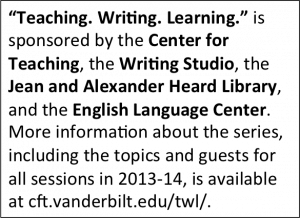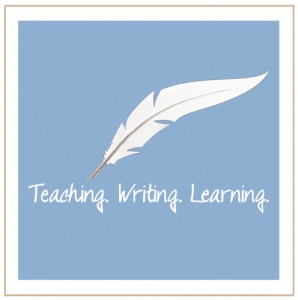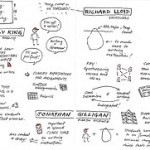Conversations on Teaching Writing Under Way
“Teaching. Writing. Learning.,” the new series of conversations on teaching writing across the campus, began last Wednesday. Emily King (English), Richard Lloyd (Sociology), and Jonathan Gilligan (Earth & Environmental Sciences) were the invited guests for kick-off event entitled “Starting the Conversation: A Panel on Inspiring Your Students to Write.”
Emily emphasized the need to define “excellent writing” in your class, as this definition will vary across levels and disciplines. She shared a wealth of concrete suggestions, addressing
- how to prepare students for writing in your class (“Practice the analysis in class that you will demand from them in their essays,” create and share with students a grading rubric for writing in your class),
- how to help students during the drafting process (workshops, staggering deadlines, drawing on the Writing Studio and the FYWS Instructor Toolkit), and
- how to help students make sense of your evaluation of their writing (“Stress again and again that WRITING IS A PROCESS,” showing your own manuscripts in progress, presenting the common writing problems in a set of papers before you return them).
Richard focused on the relationship between “substantive discussions and substantive writing”: “the quality of class discussions is reflected in predictable ways in the writing I get from students.” He wants his sociology students to think, discuss, and write “synthetically,” putting texts and ideas in conversation with each other. Such synthesis is a higher order of thinking and writing, he said, than simple interpretation, or compare and contrast.
Jonathan wants his science students to think of themselves as writers. He confessed to teaching less content and more writing in his first-year writing seminars. He regularly assigns readings from the classic writing guide The Craft of Research to help students integrate how they think about research and writing. “Why do researchers write? To communicate information. To make replication of research possible. To talk with journal editors and readers. Even to affect public policy.”
For an additional glimpse into the conversation, see CFT Director Derek Bruff’s sketchnotes (preview left).
The Next Conversation?
The remaining “Teaching. Writing. Learning.” sessions will shift to a less formal conversation to facilitate idea sharing among all attendees. On Wednesday, September 18, from 12:10-1:00, the conversation will focus on “Managing the Paper Load: Grading Writing Efficiently and Effectively.” Scott Juengel (English) will open with 10 minutes of some effective practices that colleagues from across the disciplines may use, followed by a few minutes of research-based best practices shared by the CFT, WS, and/or Library staff. During the remaining 40 minutes, attendees will have a chance to discuss their practices, challenges, and questions related to “managing the paper load.”



Leave a Response